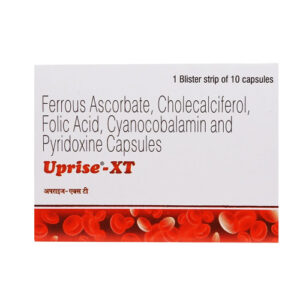VITAMIN D3 + FOLIC ACID 1.5MG + FERROUS SULPHATE&ZINC SUL
Vitamin D3: Vitamin D3, also known as cholecalciferol, is a form of vitamin D that is essential for various physiological functions in the body. It is primarily used to treat and prevent vitamin D deficiency and related conditions.
The main mechanism of action of Vitamin D3 is its conversion into calcitriol, the active form of vitamin D. Calcitriol plays a crucial role in maintaining calcium and phosphorus balance in the body. It enhances calcium absorption from the intestines and promotes calcium reabsorption from the kidneys, leading to increased levels of calcium in the blood. Vitamin D3 also exerts its effects on bone health by stimulating bone formation and mineralization.
The dosing of Vitamin D3 depends on the individual’s age, medical condition, and the severity of vitamin D deficiency. The recommended daily intake varies but typically ranges from 400 to 2000 International Units (IU). Higher doses may be required for severe deficiency cases under the guidance of a healthcare professional.
Vitamin D3 is generally well tolerated when taken at recommended doses. However, excessive intake of vitamin D3 can lead to vitamin D toxicity, which can cause symptoms such as nausea, vomiting, excessive thirst, abdominal pain, constipation, and kidney problems. Prolonged excessive intake of Vitamin D3 can also result in hypercalcemia, characterized by high levels of calcium in the blood, which can lead to bone pain, muscle weakness, confusion, and even kidney stones.
It is important to note that Vitamin D3 supplements should be used carefully, especially in individuals with certain medical conditions such as hypercalcemia, kidney stones, or sarcoidosis. It is always recommended to consult with a healthcare professional for personalized dosing instructions and to monitor vitamin D levels regularly.
Folic Acid 1.5mg: Folic Acid 1.5mg is a synthetic form of the water-soluble B-vitamin, folate. It is commonly used as a nutritional supplement to treat or prevent folic acid deficiency, especially during pregnancy.
Folic acid is essential for the production of red blood cells, DNA synthesis, and normal cell growth and development. It plays a crucial role in preventing certain types of anemia and supports fetal neural tube development during pregnancy.
The recommended dose of Folic Acid 1.5mg varies depending on the specific condition being treated. For the prevention of neural tube defects during pregnancy, the typical dose is 1.5mg per day. However, dosing may vary, and it is best to follow the advice of a healthcare provider.
Folic Acid 1.5mg is generally well-tolerated when taken at recommended doses. Rarely, individuals may experience side effects such as nausea, bloating, gas, and a bitter taste in the mouth. Allergic reactions are also possible but uncommon.
It is important to note that Folic Acid 1.5mg should not replace a balanced diet rich in natural food sources of folate, and it is recommended to consult with a healthcare professional before starting any supplementation.
Ferrous Sulphate&zinc Sul: Ferrous sulphate and zinc sulphate are two separate drugs that may be used together for specific health conditions.
1. Ferrous Sulphate:
a. Use: Ferrous sulphate is a type of iron supplement commonly used to treat or prevent iron deficiency anemia. It increases the iron levels in the body, which is necessary for the production of red blood cells and oxygen transportation.
b. Mechanism of action: Ferrous sulphate works by replenishing the body’s iron stores. Iron is an essential mineral required for the production of hemoglobin, a protein in red blood cells that carries oxygen throughout the body. Ferrous sulphate provides the necessary iron for the formation of new red blood cells, promoting proper oxygenation and energy production.
c. Dose: The dosage of ferrous sulphate varies depending on the severity of the iron deficiency anemia and individual needs. Generally, the usual adult recommended dose is 325 mg (65 mg elemental iron) orally one to three times a day. It is important to follow the dosage instructions provided by a healthcare professional.
d. Side effects: Common side effects of ferrous sulphate may include constipation, diarrhea, stomach cramps, nausea, vomiting, and dark-colored stools. In some cases, it may cause allergic reactions such as rash, itching, or swelling. It is important to consult a healthcare professional if any severe side effects or allergic reactions occur.
2. Zinc Sulphate:
a. Use: Zinc sulphate is a form of zinc supplement that is primarily used to prevent and treat zinc deficiency. Zinc is an essential mineral involved in various bodily functions, including immune function, wound healing, and DNA synthesis.
b. Mechanism of action: Zinc sulphate works by providing the body with the necessary zinc it needs for proper functioning. Zinc plays a pivotal role in numerous enzymatic reactions and is involved in cell division, protein synthesis, and immune response regulation.
c. Dose: The recommended dosage of zinc sulphate varies based on age, sex, and specific health conditions. For zinc deficiency, the typical adult dose is 220-440 mg (50-100 mg elemental zinc) orally once daily. However, it is important to consult a healthcare professional for appropriate dosing instructions.
d. Side effects: Common side effects of zinc sulphate may include nausea, vomiting, diarrhea, stomach upset, and a metallic taste in the mouth. In rare cases, it may cause allergic reactions such as rash or swelling. If any severe side effects occur, it is important to seek medical attention.
Note: Ferrous sulphate and zinc sulphate are sometimes prescribed together to address iron and zinc deficiencies simultaneously. The combination may be beneficial for certain individuals, but it is crucial to consult a healthcare professional for personalized advice and dosing instructions based on individual needs and health conditions.

